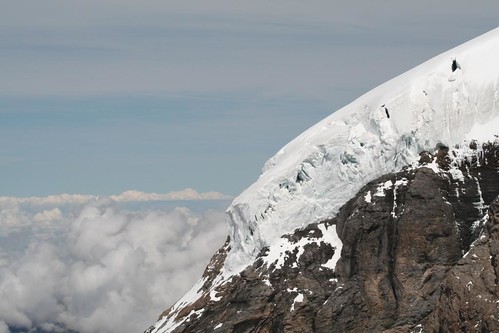 It's amazing how buildings can be symbols. In St. Gallen, Switzerland, there is a Catholic church building dating back somewhere between six and eight hundred years ago, and it stands as a symbol for Western Christianity today.
It's amazing how buildings can be symbols. In St. Gallen, Switzerland, there is a Catholic church building dating back somewhere between six and eight hundred years ago, and it stands as a symbol for Western Christianity today.In its time, it was an awesome sight: painted ceilings soar above intricate baroque latticework in copper and bronze. It was meant to inspire awe, for the congregant to walk in and immediately fall to his knees in awe of God and of the Church, and in so doing, inspire the heathen to convert.
They didn't do "seeker-sensitive" back then.
The confessionals - of which there are many - each depict a different scene - Christ walking on water, the martyrdom of Stephen, and others. The altar stands separated from the congregation by several ornate wooden railings; a golden cross stands at the front, and above it, three symbols depicting the Trinity; in the back, a massive pipe organ. All is the finest that can be had, crafted by the best artisans and architects, spared no expense. It would have shone with unmatched brilliance when the light hit the windows, making the inside almost glow as a choir sang the Gloria or the Agnus Dei before the pious masses.
Today it's a tourist attraction.
It was restored a few years ago, but only to a point; what was once copper and bronze is now green and oxidized, the gold and the paintings faded, the pews worn and empty. Sometimes the acoustics are used for orchestral or choral concerts, at which point a few people show up to listen. The rest of the time, tourists come in groups and admire the fine artistry, gawk at the organ, sit in the wooden pews, take pictures, make light conversation about the paintings, and take pictures of the altar. And then they leave, unchanged, uninspired, untouched.
It speaks so well to where we find ourselves. An empty building, forgotten except by a few tourists and its own meager congregation, an icon of glory days passed, of lost power and of waning influence. Europeans look elsewhere for their spirituality now, to science and Buddhism and New Age and - for a growing number - to Islam.
It's because of Church buildings like this that such a change began. The altar, for example, is separate from the congregation, peasants, who were deemed unclean and ineligible for communion. The masses were expected to come to church because - so far as they knew - their only option for a life better than their own was in the hands of those in power, and those in power took their money and their goods to pour into large buildings and to make themselves comfortable.
It is at this point that I run into conflicted feelings. There were obviously many who abused their power, but there were a few - some of the artisans, a few priests and bishops, many monks, and perhaps even a pope or two who were not in it for themselves, who genuinely believed they were living as Christ commanded. They poured their time into their congregations and into creating the artistic masterpieces that now sit in our cities, victims of entropy. They did what they could in a corrupt system (though most didn't challenge that system). But eventually, the people had enough and stopped going when other voices gave them a better option.
What do we do with this picture of a building, a masterpiece of art that is at once a historic marvel and contains many tragic stories? Do we chalk it up to the heathens, to those who chose to leave because they stopped believing (did they ever start), and call upon them to repent and return to the cathedral? Do we call it a failed experiment and abandon it to history and to the concerts and the tourists? How do we learn from this? How do we at once celebrate those that were truly faithful (if somewhat misguided by their culture) and avoid the pitfalls of a bureaucratized institution that would take the resources of the poor (and the rich, yes) to build a mere building when many were without food? Can art be created without exploiting others? Do we really need the building? If not in this massive all-but-abandoned structure,
where
is
the
Church
now?















